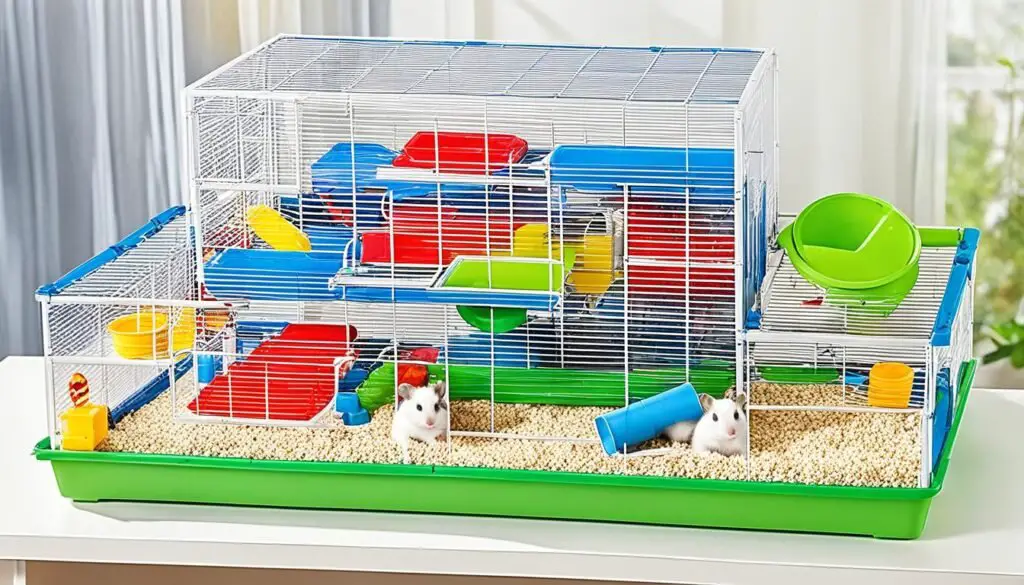Did you know that the age at which you bring home a hamster can have a significant impact on their well-being? It’s true! When buying a hamster, it’s essential to consider their ideal age to ensure they have a healthy start in their new environment. Understanding the appropriate age for purchasing a hamster is crucial to meeting their specific needs and providing them with the best possible care.
Hamsters may be considered “starter pets,” but they still require proper attention and care. By learning the ideal age for purchasing a hamster, you can set them up for a happy and fulfilling life as your new furry companion. So, let’s explore the factual data to determine when the perfect time is to bring a hamster home!
The Impact of Supporting Cruel Animal Mills
When it comes to buying a hamster, it’s crucial to be mindful of the source. Many pet stores obtain their animals from cruel animal mills, where the conditions are inhumane and the animals are mistreated. By purchasing from these pet stores, you indirectly support the operation of these mills.
An investigation conducted by PETA shed light on the shocking conditions in one PetSmart supplier. It was revealed that hamsters cannibalized one another, and the remains of deceased animals were left in the cages. This distressing revelation highlights the need for change in the industry.
To prevent contributing to animal cruelty, it is recommended to adopt hamsters from shelters instead of purchasing from pet stores. Millions of animals are euthanized each year due to the lack of good homes. By adopting from shelters, you can make a difference and help prevent animal homelessness.
Adopting from Shelters: A Responsible Choice
By adopting from shelters, you not only provide a loving home for a hamster in need but also help alleviate the ongoing homeless-animal crisis. Shelters play a vital role in rescuing and rehoming animals, giving them a second chance at life. When you choose adoption, you make a conscious decision to support ethical practices and prevent the perpetuation of cruel animal mills.
Providing Proper Housing for Hamsters
Hamsters have specific housing needs to ensure their well-being and prevent behavioral issues. It is important to provide suitable and spacious housing that meets their unique requirements.
Cages sold at pet stores often do not provide enough space for hamsters to thrive, which can lead to problems like biting, excessive urinating, and cage-bar biting. To ensure your hamster’s comfort and happiness, it is recommended to provide a minimum of 800 square inches of floor space for larger hamsters and at least 640 square inches for dwarf hamsters.
One alternative to consider is building a custom hamster enclosure. This allows you to create a space that meets your hamster’s specific needs and provides ample room for them to explore and play. Another option is using a 75-gallon (or larger) aquarium with a fitted mesh lid, as it provides a secure and escape-proof housing solution.

When selecting a cage, it is crucial to ensure the bars are not spaced too far apart to prevent hamsters from escaping. Additionally, hamsters are capable of flattening their bodies and fitting through small holes, so it’s important to create a secure environment that eliminates any potential escape routes.
By providing proper housing for your hamster, you can help prevent behavioral issues and support their overall well-being. Remember to prioritize their space and security to ensure a happy and healthy living environment.
Finding a Veterinarian for Your Hamster
Hamsters are considered exotic animals, and it can be challenging to find a veterinarian who specializes in their care. Many people are unaware of this and struggle to find appropriate veterinary care for their hamsters when they become ill. It is important to locate a specialized veterinarian beforehand to ensure prompt treatment for any health issues that may arise. However, it should be noted that veterinary care for hamsters can be costly, which may deter some people from seeking proper care. Researching local veterinarians who have experience with exotic animals and understanding the potential costs involved can help ensure your hamster receives the necessary care they need.
When looking for a hamster veterinarian, consider reaching out to exotic animal veterinary clinics or hospitals in your area. These specialized veterinarians have the necessary knowledge and experience to provide quality care for your furry friend. You can also ask for recommendations from other hamster owners or local animal shelters, as they may have valuable insights and connections.
It is essential to establish a relationship with a hamster veterinarian before any health problems arise. Regular check-ups and preventive care are vital for your hamster’s well-being. During these visits, the veterinarian can assess your hamster’s overall health, provide vaccinations if necessary, and offer guidance on nutrition, exercise, and proper housing.
When seeking specialized vet care, keep in mind that the cost of hamster care may be higher compared to more common pets. The reasons for this include the specialized training and equipment required to care for exotic animals. Before choosing a veterinarian, it is a good idea to inquire about their fees and payment options. Some veterinarians offer pet insurance plans or payment arrangements to help alleviate the financial burden.
Meeting Hamster’s Dietary and Behavioral Needs
When it comes to meeting your hamster’s needs, diet and behavior play a crucial role in their overall well-being. Providing the right nutrition and a stimulating environment is essential to keep your furry friend happy and healthy.
Start by focusing on their diet. Hamsters should primarily be fed store-bought pellets specially formulated for their nutritional needs. These pellets are designed to provide the right balance of vitamins, minerals, and proteins that are essential for their growth and development. Don’t forget to supplement their diet with occasional treats like nuts, fresh fruits, and vegetables, but remember to keep them in moderation to prevent obesity.
Hamsters also have special dental requirements. Their teeth are constantly growing, so it’s crucial to provide them with hard, digestible items to chew on. You can find a variety of chew toys and sticks made specifically for hamsters at pet stores. These chew toys not only help keep their teeth in check but also provide mental stimulation.
Another important aspect of hamster care is exercise. Hamsters are naturally active creatures, and they require regular physical activity to maintain their health. Introducing an exercise wheel in their enclosure is a great way to provide them with the opportunity to run and burn off energy. Additionally, you can add tunnels and climbing structures to create a stimulating environment that satisfies their curiosity and instincts.
Unlike some other pets, hamsters are solitary animals and do not require companionship from other hamsters. In fact, housing them together can often lead to aggression and other behavioral issues. So, focus on providing your hamster with an environment where they can feel safe and secure on their own. Make sure their cage or enclosure is spacious enough, with plenty of hiding spots, bedding material, and toys to keep them entertained.
By addressing your hamster’s dietary and behavioral needs, you’ll be ensuring their overall health and happiness. Remember to provide a well-balanced diet, chew toys for dental care, opportunities for exercise, and a suitable solitary environment. With your love and attention, your hamster will thrive and be a delightful companion for years to come.
